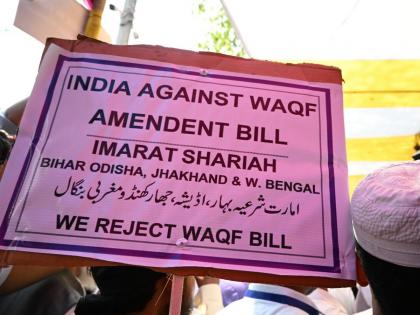Alvida Jummah 2025: AIMPLB Urges Muslims to Wear Black Armband On 'Last Friday of Ramzan' Prayers to Protest Against Waqf Bill
By Lokmat English Desk | Updated: March 28, 2025 08:46 IST2025-03-28T07:06:49+5:302025-03-28T08:46:45+5:30
The All India Muslim Personal Law Board has urged Muslims to wear a black armband on their right hand ...

Alvida Jummah 2025: AIMPLB Urges Muslims to Wear Black Armband On 'Last Friday of Ramzan' Prayers to Protest Against Waqf Bill
The All India Muslim Personal Law Board has urged Muslims to wear a black armband on their right hand when they go for Juma prayers on the last Friday of Ramzan as a mark of their protest against the Waqf (Amendment) Bill. AIMPLB general secretary Maulana Mohammed Fazlur Rahim Mujaddidi issued a video appeal posted on the Board's X handle in which he urged people to wear a black armband on their right hand when they go for prayers.
"Protests by the AIMPLB against the Waqf (Amendment) Bill continue. In that context, register your protest on the occasion of Alvida Jummah 2025 (last Friday of Ramzan)," he said. He urged Muslims to put a black armband on their right hand and share a video of it while also sending it to the online desk of All India Muslim Personal Law Board (AIMPLB).
Also Read | TN Assembly passes resolution urging Centre to withdraw Waqf Bill; BJP walks out.
The All India Muslim Personal Law Board (AIMPLB) earlier on Sunday announced a nationwide agitation against the Waqf (Amendment) Bill, 2024. As part of the first phase of the protest, large sit-ins are planned in front of the state assemblies in Patna and Vijayawada on March 26 and 29, respectively.
All India Muslim Personal Law Board (AIMPLB) has appealed to all Muslims in India to wear black bands on Jumu'atul-Wida in protest against the Waqf (Amendment) Bill pic.twitter.com/gG0DUn6K4R
— IANS (@ians_india) March 28, 2025
On Wednesday, protests against the Waqf Bill rocked Bihar, from the legislature to the streets, as political parties within the state and outside stood in solidarity with the AIMPLB, which organised a 'maha dharna' in Patna.
The AIMPLB demonstrations were held barely a kilometre away from the Vidhan Sabha premises. They demanded the rollback of the Bill brought by the Narendra Modi government at the Centre and requested "secular" leaders like Chief Minister Nitish Kumar reconsider "support" for the contentious legislation.
The AIMPLB's 31-member Action Committee has resolved to adopt all constitutional, legal, and democratic means to oppose the bill, which it has described as "controversial, discriminatory and damaging." The AIMPLB said in a statement that major rallies are scheduled to be held in Hyderabad, Mumbai, Kolkata, Bengaluru, Malerkotla (Punjab), and Ranchi.
The AIMPLB's statement comes after Parliament's joint committee submitted its report on the Waqf (Amendment) Bill. Though not listed yet, there is speculation that the proposed legislation could be brought for passage in Parliament during the ongoing Budget Session.
After multiple sittings and hearings, the 31-member panel on the bill suggested several amendments to the proposed legislation, even as the opposition members disagreed with the report and submitted dissent notes. The 655-page report was submitted to Lok Sabha Speaker Om Birla on January 30.
The joint committee adopted the report that contained changes suggested by members of the ruling BJP by a 15-11 majority vote. The move prompted the opposition to dub the exercise an attempt to destroy Waqf boards. The Bill was referred to the joint committee on August 8 last year, following its introduction in the Lok Sabha by Union Minority Affairs Minister Kiren Rijiju.
Bareilly, Uttar Pradesh: National President of All India Muslim Jamaat, Maulana Shahabuddin Razvi on AIMPLB's appeal to all Muslims to wear black bands on Jumu'atul-Wida in protest against the Waqf (Amendment) Bill says, "...These religious leaders should understand that the… pic.twitter.com/qXnmUuqx9L
— IANS (@ians_india) March 28, 2025
Maulana Shahabuddin Razvi said, "These religious leaders should understand that the month of Ramadan is meant for worship, not politics. By doing this, they have politicized the sacred month...I appeal to Muslims not to fall for the misguidance of the AIMPLB and to completely ignore their call to wear black armbands. The Board's actions are not religious but political, aimed at saving its diminishing influence—a wrong strategy, as the Board was originally formed for religious and social matters, not politics."
Open in app